Think Tank
Video chats
Video recap: State of Romania
11 December 2024
6 July 2023
The events in CEE countries impact the EU’s overall democratic security developments, amplified due to the ongoing war. As the new EU Strategic Agenda is in preparation, the Visegrad Insight expert group scans for weak signals across multiple scenarios and recommends a relevant course of action.
Click here for more information on the project

As the landscape of V4 politics continues to shift and evolve, unity and disunity are themes impacting policy at the national and EU levels. This quarterly report examines the previously defined axioms affecting democratic security through our weekly foresight and surveyed network of fellows. Insights drawn from this process offer a unique perspective on these complex issues, providing a comprehensive understanding of the current state of European unity and disunity. The issues addressed range from significant political shifts in Slovakia to contentious policy debates in Poland and Hungary and from corruption allegations in Czechia to the complex interplay of power and influence shaping the European Union’s future.
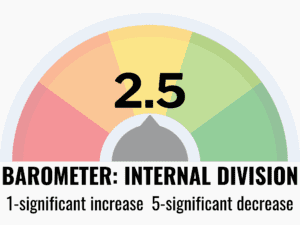
In a significant political shift, Slovak President Zuzana Čaputová confirmed her decision not to seek re-election next year. As a prominent pro-Western and pro-Ukrainian politician, Čaputová’s tenure has been marked by continual derision from former Prime Minister Robert Fico and right-wing factions, characterising her as an “American poodle”. This decision arises amidst increasing speculation that Čaputová may seek to hinder the potential formation of a government led by Fico. Furthermore, Slovakia finds itself at the heart of an “information storm”, with its foreign policy under fire as political tension escalates in the run-up to the 30 September vote. Reports suggest that this political unrest is intertwined with allegations of manipulative election fraud, with the far-right party Republika disseminating rumours of potential election falsification and pledging to organise a parallel vote count.
Poland and Hungary are intensifying their objection to a new EU asylum management agreement, misrepresenting it as enforced migrant relocation from South to Central Europe. The EU’s controversial suggestion of charging countries for refusing migrants, aimed at resolving disputes over asylum policy reforms, is being questioned by Slovakia and the Czech Republic, who challenge the proposed €22,000 fee. This resistance is spearheaded by Poland’s Jarosław Kaczyński pushing for a sovereignty referendum, seen as a move to boost his Law and Justice party’s waning election campaign. However, a recent poll shows only a third of Poles support his hardline approach. At the same time, 42% would agree to the fee if linked to financial assistance for Ukrainian refugees Poland has sheltered since the war began, and 22% would agree without financial aid.
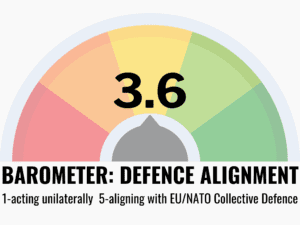 The EU Council has approved a one billion euro joint procurement for ammunition production to aid Ukraine under the European Peace Facility, aiming to supply 155-mm-calibre artillery rounds to the Ukrainian Armed Forces. The United States Congress halted a $735 million arms delivery to Hungary as Budapest continues delaying the ratification of Sweden’s NATO membership, eying at Turkey to agree first. Similarly, Budapest agreed to Finland membership immediately when Ankara did. Ulf Kristersson, the Prime Minister of Sweden, said that Budapest would not stall Stockholm’s NATO membership, claiming assurances from Viktor Orbán himself. Hungary has blocked an EU decision to allocate €500 million from the European Peace Facility for Ukraine’s arms in response to Ukraine listing Hungary’s largest bank, OTP, as a “war sponsor” due to alleged favourable credit terms for the Russian military. During President Zelenskyy’s recent visit to Berlin, Germany demonstrated an unprecedented commitment to backing Ukraine in its battle against Russia and pursuing EU membership. This support was embodied in a joint political declaration and a new $3 billion arms package for Kyiv. Germany has also introduced its much-anticipated national security strategy, spotlighting Russia as the primary threat to European and German security. However, critics contend the strategy needs detailed plans regarding collaboration with CEE countries in addressing this issue.
The EU Council has approved a one billion euro joint procurement for ammunition production to aid Ukraine under the European Peace Facility, aiming to supply 155-mm-calibre artillery rounds to the Ukrainian Armed Forces. The United States Congress halted a $735 million arms delivery to Hungary as Budapest continues delaying the ratification of Sweden’s NATO membership, eying at Turkey to agree first. Similarly, Budapest agreed to Finland membership immediately when Ankara did. Ulf Kristersson, the Prime Minister of Sweden, said that Budapest would not stall Stockholm’s NATO membership, claiming assurances from Viktor Orbán himself. Hungary has blocked an EU decision to allocate €500 million from the European Peace Facility for Ukraine’s arms in response to Ukraine listing Hungary’s largest bank, OTP, as a “war sponsor” due to alleged favourable credit terms for the Russian military. During President Zelenskyy’s recent visit to Berlin, Germany demonstrated an unprecedented commitment to backing Ukraine in its battle against Russia and pursuing EU membership. This support was embodied in a joint political declaration and a new $3 billion arms package for Kyiv. Germany has also introduced its much-anticipated national security strategy, spotlighting Russia as the primary threat to European and German security. However, critics contend the strategy needs detailed plans regarding collaboration with CEE countries in addressing this issue.
Poland and South Korea have confidentially agreed on a $9.2 billion loan to finance Poland’s defence orders. The clandestine nature of this loan was revealed through a parliamentary process in Korea, showing a lack of democratic control within Poland’s ruling PiS party regarding defence matters.
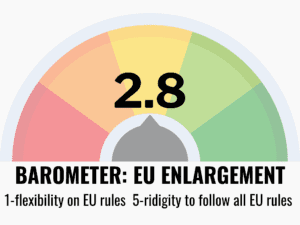
Standing alone, Hungary was the only EU nation refraining from endorsing an EU statement condemning the deteriorating human rights conditions in Belarus, as highlighted by a recent OSCE report. The statement, issued by the Swedish Presidency of the EU on behalf of 26 member states, criticised the Minsk regime’s politically charged repression, leading to a significant increase in political prisoners.
Hungary, Poland and Slovakia have implemented unilateral bans on Ukrainian grain imports, casting doubts on supporting Ukraine’s EU Accession. Despite the cost-efficiency of Ukrainian grain and the potential for Central European countries to serve as distribution hubs, these bans aim to protect local agricultural sectors from price and sales downturns due to logistical difficulties associated with an influx of Ukrainian grains. The European Commission enacted import restrictions on Ukrainian grain and other goods in Poland and four other eastern EU countries in response to a previous blockade by these countries due to oversupply lowering local market prices. They have committed to lifting these blockades.
European Parliament President Roberta Metsola has expressed her desire for the European Union to commence substantial discussions regarding Ukraine’s EU membership application in mid-December this year. It also reported how Ukraine had fulfilled two of the seven requisite conditions set by Brussels. These completed reforms, crucial for initiating formal accession talks, involve modifications to high-level judicial bodies and aligning media sector legislation with EU standards. All V4 countries urge to speed up the integration process for Ukraine to be in the EU, a rare unifying front for the group.
The second European Political Community meeting was held in Moldova, uniting leaders from 45 countries. International support for Ukraine was reaffirmed in response to ongoing Russian aggression, emphasising the commitment to supply armaments, prepare counteroffensives, and establish a training framework for Ukrainian fighter pilots. The summit showcased continued support for Moldova, including logistical and security aspects, while offering aid to the Moldovan people via an EU mission to combat hybrid threats and adopt sanctions against those attempting to destabilise Moldova.
Prime Minister of North Macedonia Dimitar Kovachevski expressed optimism about improving relations with Bulgaria following the formation of a stable political cabinet. Renew Europe asserts that escalating speculation and populist rhetoric in both North Macedonia and Bulgaria hinder the establishment of productive dialogue. An upcoming meeting between the foreign ministers of North Macedonia and Bulgaria is anticipated to bring more fruitful accession talks for North Macedonia.
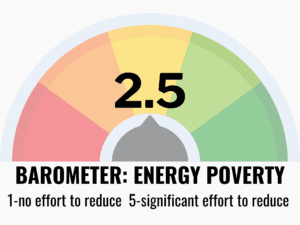 As the EU is on course to recognise nuclear energy as part of their green objectives, Poland’s Minister of Climate and Environment Anna Moskwa recently stated that 73% of Polish electricity in 2040 will come from renewables and nuclear. After several lithium-ion battery production investments, Poland’s capacity reached 73 GWh in 2022. This growth positioned Poland as the second largest producer globally, surpassing the US and trailing only China.
As the EU is on course to recognise nuclear energy as part of their green objectives, Poland’s Minister of Climate and Environment Anna Moskwa recently stated that 73% of Polish electricity in 2040 will come from renewables and nuclear. After several lithium-ion battery production investments, Poland’s capacity reached 73 GWh in 2022. This growth positioned Poland as the second largest producer globally, surpassing the US and trailing only China.
Meanwhile, the Polish government has disregarded a Warsaw court’s suspension of an environmental permit for a significant lignite coal mine. The court, responding to a lawsuit from Polish, Czech, and German ecological groups, found that the license for expanding the Turów mine near the Czech and German borders violated EU environmental regulations. The permit was initially granted for the period between 2026 to 2044. Despite being Europe’s leading exporter of electric buses and a substantial EV battery producer, Poland alone voted against the EU’s combustion engine ban from 2035. As the EU revises its renewable energy targets to require 42.5% of energy from renewable sources by 2030 (an increase from 32%), V4 countries, such as Poland, have resisted the EU’s 2035 combustion engine ban and are embroiled in legal disputes over the Turów lignite mine. Implementing such EU standards will remain difficult without local consultation with business leaders, necessitating a platform that brings together business leaders, civil society actors, and government representatives.
For the first time, Czech state-owned company ČEPS had to disconnect hundreds of solar plants from the national power grid due to a surplus created by sunny weather and high production levels. Experts predict similar situations in the future due to the country’s solar boom, a response to cutting dependency on Russian fossil fuel imports. Following a six-month hiatus due to Russian strikes on its energy infrastructure, Ukraine completed necessary repairs in April and can now resume electricity exports. The EU, Ukraine’s primary energy export market since the war onset, will again receive Ukrainian electricity.
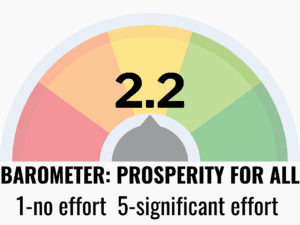 The EU has implemented the groundbreaking AI Act, introducing advanced privacy standards, stringent transparency requirements, and strict penalties for non-compliance, thereby leading global AI regulation. V4 countries are at a pivotal point in their digital transformation. They will prioritise tech-friendly policies, transparency, citizen involvement, cyber security, education, market protection, data management, and ethical AI implementation. Read more on the complex digital challenges the region faces here.
The EU has implemented the groundbreaking AI Act, introducing advanced privacy standards, stringent transparency requirements, and strict penalties for non-compliance, thereby leading global AI regulation. V4 countries are at a pivotal point in their digital transformation. They will prioritise tech-friendly policies, transparency, citizen involvement, cyber security, education, market protection, data management, and ethical AI implementation. Read more on the complex digital challenges the region faces here.
Inflation rates in the region have decreased significantly, with Poland, Slovakia, the Czech Republic, and Hungary all reporting lower-than-expected rates. June’s Polish inflation rate was slightly lower than anticipated at 11.5%. Slovakia’s annual inflation rate dropped for the third consecutive month to 11.9% in May 2023, the weakest since April 2022. The Czech Republic’s annual inflation eased to a 15-month low of 11.1% in May 2023, marginally above the predicted 10.9%. Hungary’s annual inflation rate in May 2023 fell to 21.5%, below the forecasted 22.3%.
The Czech centre-right government led by Petr Fiala revealed an austerity plan to reduce the state budget deficit by €4bn in 2024 and further in 2025. The measures include elevating the pension age, augmenting corporate and real estate taxes, and raising the tax on draught beer. In Poland, significant socio-economic reforms, encompassing heightened child benefits, the promotion of foreign investment, expedited green transition, and military fortification are being advocated by both Law and Justice (PiS) and Civic Platform (KO). Notably, the EPP-aligned Civic Platform is now vying for swifter and more extensive reforms than the ECR-affiliated Law and Justice. Signifying Poland’s attractiveness for foreign capital, Intel has invested $4.6 billion in a Wroclaw chip plant, with more substantial investment talks with Germany in progress.
The energy crisis is a key factor determining the V4’s ability to continue catching up with Western levels of prosperity. Following earlier pandemic-era disruption to supply chains and loose fiscal and monetary policies, the energy crisis pushed inflation rates to levels almost twice as high as the EU average. This was acute in Poland and Hungary, where central bank independence has been undermined, reflecting a broader trend in these two countries towards capturing independent regulators. Both economies suffer from creeping oligarchisation and a deteriorating business environment, which may hobble their ability to regain momentum and provide equitable benefits of growth to broader society.
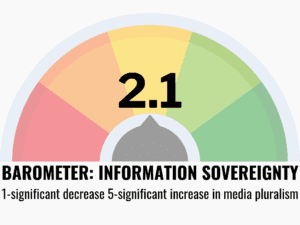
Trust in media is at an all-time low in V4 countries, according to the recent GLOBSEC Trends report. Czechia ranks the highest in the V4, with the majority of society trusting their media (53%), while the opposite is true for Hungary (27%), Poland (32%), and Slovakia (37%). While Czechia (14) and Slovakia (17) rank high on the 2023 World Press Freedom Index, Hungary (72) and Poland (57) trend in the opposite direction, but overall, CEE improved in comparison to 2022. Civil society groups and journalists associations recently called on the European Council to safeguard journalists from spyware and surveillance through the European Media Freedom Act (EMFA), including the Gazeta Wyborcza Foundation, Helsinki Foundation for Human Rights, and the Society of Journalists in Poland with the Hungarian Press Union.
In response to allegations of government attempts to control Poland’s two largest news websites, Wirtualna Polska and Onet, the chief editors of most major private Polish media outlets have collectively defended independent journalism. The 47 editors pledged to uphold media freedom and independence as democratic cornerstones, safeguarding citizens’ rights to trustworthy information. Hungarian investigative platform, Átlátszó, highlighted its recent discoveries in Hungary and reported being targeted by pro-government media in an apparent defamation campaign. The allegations against it involve treason, inciting hatred towards overseas minorities, advancing foreign interests, and constituting a national security threat.
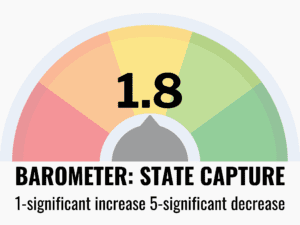 Poland’s ruling Law and Justice (PiS) party is pushing a controversial bill to establish a “Russian influence” investigation committee, equipped with powers including barring individuals from holding office for a decade. Critics say it is an attempt to retain control for themselves and is seen as an instrument of competition. It has been sent to the constitutional tribunal, paralysed on critical issues related to judicial reforms, most notably, the battle between the supreme court and constitutional court over competencies. Meanwhile, a judicial reform agreed with the EU Commission has been submitted by the President to the Constitutional Court and remains stuck there with not enough judges to proceed. This summer, the government vowed to change the court’s procedures through a legislative act.
Poland’s ruling Law and Justice (PiS) party is pushing a controversial bill to establish a “Russian influence” investigation committee, equipped with powers including barring individuals from holding office for a decade. Critics say it is an attempt to retain control for themselves and is seen as an instrument of competition. It has been sent to the constitutional tribunal, paralysed on critical issues related to judicial reforms, most notably, the battle between the supreme court and constitutional court over competencies. Meanwhile, a judicial reform agreed with the EU Commission has been submitted by the President to the Constitutional Court and remains stuck there with not enough judges to proceed. This summer, the government vowed to change the court’s procedures through a legislative act.
Amid economic woes, Hungary is attempting judicial reform to unlock an estimated €13 billion in EU cohesion funds. However, other issues – such as democratic backsliding, perceived homophobic laws, treatment of asylum seekers and concerns over academic independence – have continued to impede the release of additional funds. State capture in Czechia is in the spotlight; it ranks second on The Economist’s crony capitalism index, with kleptocratic businesses accounting for 15% of the nation’s GDP. The country has also been fined €2.3 million for failing to implement the EU’s directive to protect whistleblowers. In the energy sector, charges have been upheld against AVE CZ, a company with significant ties to energy oligarch Daniel Křetínský, for systematic avoidance of environmental taxes.
Slovakia’s central bank head Peter Kažimír has been found guilty of corruption, leading to calls for his resignation. Meanwhile, populist leader Robert Fico supports Kažimír, asserting that whistleblower allegations are fabricated, even as his party leads the polls despite multiple high-profile corruption investigations.
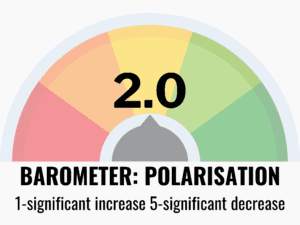
In Poland, a protest rally against the ruling Law and Justice (PiS) party drew almost 500,000 participants amidst claims of state TV censorship and allegations of opposition collusion with Russia. This follows President Andrzej Duda’s signing of a PiS initiative – a contentious “investigating Russian influence” law, which he later proposed amendments under international pressure. Hungarian President Katalin Novak vetoed a law perceived as anti-LGBTQ+, criticising a clause permitting anonymous reports against same-sex couples for challenging constitutionally recognised family norms, stating it weakens the protection of fundamental values. Interestingly, 56% of Hungarian respondents agreed that LGBTI+ rights should be ensured. The Hungarian state’s actions starkly contrast with Estonia, which became the second country in CEE to allow same-sex marriages after an acrimonious parliamentary debate.
Slovaks show a propensity towards disinformation, majorly accepting anti-LGBTI+ narratives and opposing liberal democracy’s benefits. While trust in media is low at 37%, nearly two-thirds view media as free, indicating the region’s most significant trust gap. Trust in public institutions, such as the government (18%) and the president (37%), is notably low. In Czechia, the cabinet approved the Istanbul Convention on preventing violence against women for ratification by the Chamber of Deputies. Though the ruling coalition has a majority, it is still being determined whether all its parliamentarians will back it.
_
Authors
Miles R. Maftean, Editorial Director
Wojciech Przybylski, Editor-in-Chief
Project
Visegrad Insight is the main Central European analysis and media platform. It generates future policy directions for Europe and transatlantic partners. Established in 2012 by the Res Publica Foundation.
Foresight on European Values and Democratic Security (FEVDS). This project engages CEE experts in a foresight-driven debate on the future EU policy development to protect European values and freedoms.